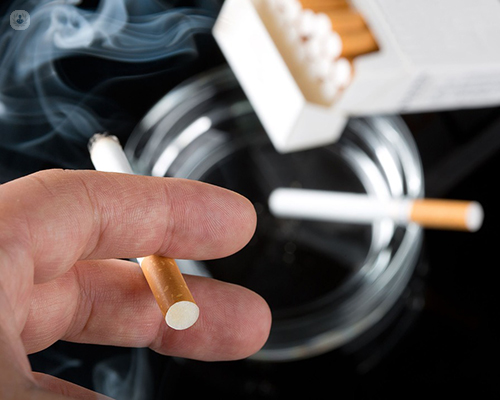Smoking and your cardiovascular health
Written by:Smoking, along with other risk factors, accelerates the progression of coronary artery disease and increases the chances of heart attack. This is mainly due to the effect smoking has on your blood vessels that supply blood to your body. Dr Rodney Foale, a leading cardiologist, explains how smoking harms your cardiovascular health and how quitting smoking can improve this.
What impact can smoking have on the heart?
Smoking reduces the amount of oxygen carried in your blood as well as damaging the walls of your blood vessels. Smoking also contributes to the development of atherosclerosis (the clogging of arteries). This both reduces the amount of blood flow and oxygen supply, but also increases the risk of thrombosis and hence potential heart attacks, claudication or stroke.

What are the most common cardiovascular diseases related to smoking?
The following are the most common:
- Angina pectoris, caused by clogging of the coronary arteries (arteries of the heart).
- Stroke, due to clots from diseased carotid arteries (arteries of the brain)
- Leg pain (claudication) due to blocked arteries of the leg (peripheral artery disease).
What are the signs that I need to see a doctor?
If you find that you have become in ANY way restricted in performing normal exercises, such as walking or climbing a flight of stairs, you should seek advice from a cardiovascular specialist. The following exercise symptoms are important warning signs of artery disease in the heart or periphery:
- Tightness / pain in the chest or throat (usually central)
- Breathlessness
- Fatigue
- Leg pain
The following symptoms occurring at any time may well herald stroke and likewise urgent advice sought:
- Any transient loss of vision
- Speech change
- One-sided limb weakness
- Changes in sensation (tingling, numbness or clumsiness)
Should I have a heart check-up if I smoke?
Yes, most certainly. In addition to the full clinical examination seeking the signs of artery obstruction, a functional test, that is a test of blood supply to the exercising heart should be performed. There are various tests to suit different patients, but a treadmill test is a good start and often sufficient in my opinion. But other tests should be considered which might include coronary angiography, which nowadays can be a simple and definitive investigation
Should there be a suspicion of peripheral artery narrowing in vessels of the brain or legs, then ultrasound tests of these vessels should be performed .
If I quit smoking, what’s the timeline of improvement?
Usually, after a patient adjusts (often painfully) to the cessation of a smoking addiction or even simple ingrained habit, an immediate beneficial effect will be experienced – there is nothing like the change of a long-standing bad habit to improve confidence and a sense of well-being by doing something good. The later beneficial effects include improvement of the heart and arterial blood flow too. Such improvements might take a bit longer, but with patience and time, your cardiovascular health will improve and eventually normalise. It is the single most impressive step to take on the pathway to a normal quality, and normal length of life.
If you are concerned about your cardiovascular health or would like to see a specialist about quitting smoking, make an appointment with an expert.


